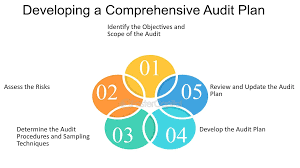
The Importance of a Comprehensive Audit
Conducting a comprehensive audit is a vital process for businesses and organisations to ensure compliance, accuracy, and efficiency in their operations. An audit involves a systematic review and evaluation of financial records, processes, and controls to identify any discrepancies, risks, or areas for improvement.
One of the key benefits of a comprehensive audit is the ability to detect and prevent errors, fraud, or non-compliance with regulations. By thoroughly examining all aspects of an organisation’s financial activities, internal controls, and reporting mechanisms, auditors can provide valuable insights that help safeguard the integrity and reputation of the business.
Furthermore, a comprehensive audit can also uncover inefficiencies or opportunities for cost savings. By analysing financial data and operational procedures, auditors can recommend changes that enhance performance, streamline processes, and maximise resources.
Another important aspect of a comprehensive audit is its role in enhancing transparency and accountability. By conducting regular audits and disclosing the findings to stakeholders, businesses can demonstrate their commitment to sound governance practices and build trust with investors, customers, and regulatory authorities.
In conclusion, a comprehensive audit is an essential tool for ensuring the financial health and operational effectiveness of any organisation. By investing in thorough audits conducted by qualified professionals, businesses can proactively manage risks, improve decision-making processes, and maintain compliance with industry standards.
Five Essential Tips for Conducting a Thorough and Effective Financial Audit
- Ensure all financial records are accurate and up-to-date.
- Review internal controls to identify any weaknesses or areas of improvement.
- Verify the existence and value of assets listed on the balance sheet.
- Confirm compliance with relevant laws and regulations.
- Communicate effectively with management to address any findings or concerns.
Ensure all financial records are accurate and up-to-date.
It is crucial to ensure that all financial records are accurate and up-to-date when conducting a comprehensive audit. By maintaining meticulously detailed and current financial records, businesses can enhance the audit process’s efficiency and effectiveness. Accurate records provide auditors with a clear overview of the organisation’s financial health, enabling them to identify any discrepancies or irregularities promptly. Moreover, up-to-date records facilitate informed decision-making, support transparency, and demonstrate a commitment to sound financial management practices. By prioritising the accuracy and timeliness of financial records, businesses can streamline their audit procedures and maintain a strong foundation for sustainable growth.
Review internal controls to identify any weaknesses or areas of improvement.
When conducting a comprehensive audit, it is crucial to review internal controls meticulously to pinpoint any weaknesses or areas requiring improvement. By scrutinising the effectiveness of internal controls, auditors can identify vulnerabilities that may expose the organisation to risks such as fraud or errors. Addressing these weaknesses proactively not only enhances the integrity of financial processes but also strengthens overall operational efficiency and compliance with regulatory standards. Regularly assessing and refining internal controls through audits ensures that businesses can mitigate potential threats and maintain robust governance practices.
Verify the existence and value of assets listed on the balance sheet.
When conducting a comprehensive audit, it is crucial to verify the existence and value of assets listed on the balance sheet. This process involves physically inspecting assets, reviewing supporting documentation, and confirming their ownership and valuation accuracy. By ensuring that the assets reported in the financial statements actually exist and are correctly valued, auditors can provide assurance regarding the reliability and integrity of the company’s financial position. This step helps mitigate the risk of misstatement or fraud related to asset values, contributing to a more accurate representation of the organisation’s financial health.
Confirm compliance with relevant laws and regulations.
Confirming compliance with relevant laws and regulations is a critical aspect of a comprehensive audit. By ensuring that all financial activities and operational processes align with the legal requirements set forth by governing bodies, businesses can mitigate risks of penalties, fines, or reputational damage. Conducting thorough checks and assessments to confirm compliance not only helps in avoiding legal issues but also demonstrates a commitment to ethical practices and responsible corporate governance. It is essential for businesses to stay up-to-date with the evolving regulatory landscape and incorporate compliance verification as a key component of their audit processes to uphold integrity and trust within their operations.
Communicate effectively with management to address any findings or concerns.
Effective communication with management is crucial when addressing findings or concerns identified during a comprehensive audit. By clearly articulating the results of the audit and discussing any potential issues, auditors can work collaboratively with management to develop appropriate solutions and implement necessary changes. Open and transparent communication fosters a culture of accountability and continuous improvement within the organisation, ensuring that corrective actions are taken promptly to enhance operational efficiency and compliance.
